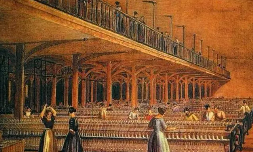Growth Education Western naturalistic education growth view
3 min read
Naturalistic educational thought.It is in the history of western educationAn important idea.Not only in education.Plays an important role in the course of history.For our education today.Still has important guiding value.The west.Aristotle from the time of Ancient Greece.To Comenius in the Renaissance.Rousseau of the Enlightenment.And progressive educator John Dewey.They are of the same mind.It is also consistent in the history of western education.In ancient Greece, Aristotle believed that man had the germ of nature’s ability to develop, and that education could make this possibility a reality.
During the Renaissance, Comenius, the father of pedagogy, was influenced by Aristotle’s thought of “internal development” and compared the psychology of children to “seeds” or “millet”. He believed that children had the greatest possibility of development and that children’s development was from the inside out. Comenius also believed that “seeds are buried in the ground, down to the root bud, and up to the shoots, which, by their natural power, later grow into branches and leaves, to blow shade, and adorn flowers and fruits.” Even a small seed can catch the wind and grow into a huge tree.
Rousseau was a thinker, famous writer and educator in the French Enlightenment movement in the 18th century. Rousseau advocates natural education, the core of which is that education must follow the law of nature and conform to human nature. Rousseau opposed the traditional classical education that interferes with and restricts the free development of children regardless of their characteristics, and violates their nature, so he put forward the idea that education should conform to nature. In his book Emile, he begins by saying that all that comes out of the hand of the Creator is good, and in the hands of man all is bad. Rousseau divided the cultivation process of natural person into four stages: infancy, childhood, juvenile and youth, and stipulated that the focus of education in each stage is physical education, sensory organ training, intellectual education, labor education and moral education.
In the 19th century, John Dewey (1859-1952), the famous American pragmatist educator, put forward the idea that education is growth. According to Dewey’s understanding, education should adapt to the regularity and stages of children’s physical and mental development, and meet children’s interests, hobbies and needs. The essence of “education is growth” is to let children become the subject in the process of education, education should be consistent with the physical and mental development of children, in this process educators should give children appropriate guidance. From the perspective of educators, the external environment should be consistent with the inner growth of children, so that individuals can develop better, and then promote the progress of society.
Growth education should lay stress on students’ growth, which is directly derived from Dewey’s thought of education as growth. Students, especially primary school students and junior high school students, are in an immature state of knowledge and experience, world outlook, outlook on life, values and so on. This immature state provides infinite possibilities for education to help students grow. Our education should provide various conditions for students to grow, provide various methods to promote students’ growth, and stimulate students’ desire to grow. Mobilize the power of students’ continuous growth, tap the potential of students’ continuous growth, in order to maximize the healthy growth of students, let growth education shine.






